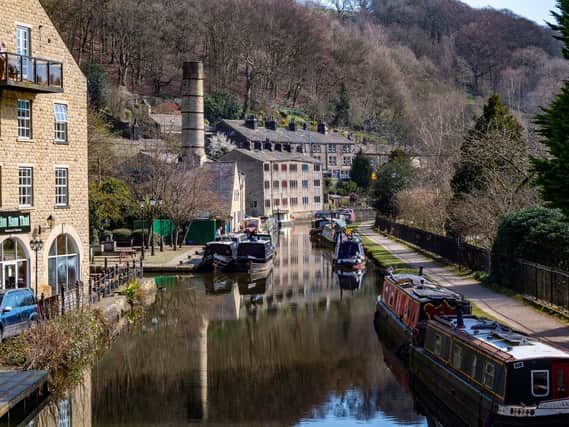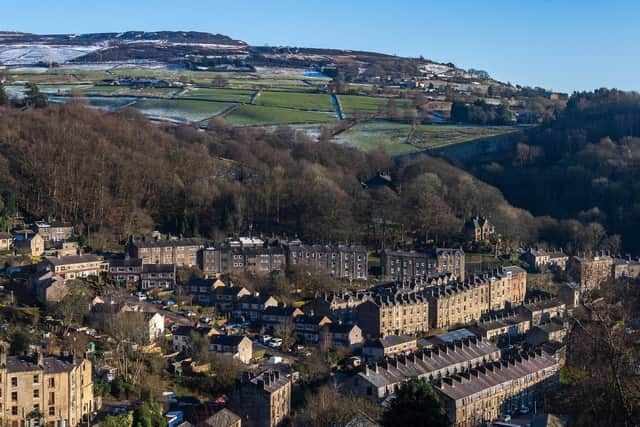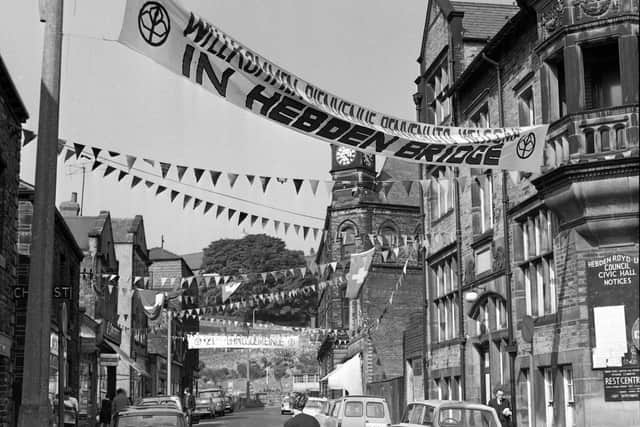Hebden Bridge - a 'magical' town full of writers and poets and an independent streak


Its reputation as a haven for writers has accelerated in recent years, and a new generation of authors, poets and screenwriters have flocked to the West Yorkshire town.
Set against the backdrop of a merciless Pennine landscape, where slate-grey rain and westerly winds blow horizontally through the streets, Hebden Bridge’s residents are at the mercy of this unforgiving climate.
Advertisement
Hide AdAdvertisement
Hide AdIt is a place to experience the brightest of rainbows, or the harshest hailstones but perhaps this appalling weather is connected to the bountiful creativity of the area? There is nothing better to do on a bleak-black sodden day than stay in, keep warm, light the fire and travel to exotic places through the imagination.


The local population has a mix of offcumdens (a term for people from outside the area who have settled, although I prefer the poetic alternative of ‘blow-ins’) and original old families reaching back to the industrial era.
Many recent additions have moved from London, Manchester and Leeds, with a propensity towards free-thinking, radicalism or the eco-movement.
Although this isn’t a behaviour strictly limited to recent times: Hebden has a fierce tradition of resistance reaching back to the Chartists, the early Co-operative movement, and the Cragg Vale Coiners.
Advertisement
Hide AdAdvertisement
Hide AdIt is a town full of people from other places, and this cosmopolitan atmosphere attracts visitors from across the country. It is unique in the sense that there is no other community like it in the North.


Back in the 1960s, Hebden was almost demolished to make way for a motorway but was maintained by a generation of hippies who moved to the area to squat the abandoned over-dwelling and under-dwelling buildings that line its vertiginous streets.
Thanks to their defiance, Hebden Bridge has been preserved, and the architecture, alongside its canal and walking routes, has made it a popular tourist attraction.
In Ted Hughes’s poem, Stubbing Wharfe, the future Poet Laureate writes of a day spent with his wife, the poet Sylvia Plath amongst the ‘gorge of ruined mills and abandoned chapels’ and how the ‘windows glittered black.’
Advertisement
Hide AdAdvertisement
Hide AdAt the time of his poem, the town’s sandstone buildings were mostly coated with coal dust: if it wasn’t sticking to the brickwork it was certainly lining the lungs of its residents.
That belligerent, resistant dourness that Hughes captured was astutely observed in photographer Martin Parr’s The Non-Conformists, which contains images of the town from 1975-79, when he was a founder of Albert Street Workshop. ‘The Ancient Order of Henpecked Husbands annual general meeting’ shows an Easter Monday chapel conflab complete with pipe smoke, tweed overcoats and the air of no-nonsense.
One imagines the wives at home: tabard-wearing battleaxes scrubbing front steps and cleaning net curtains. Yet now, in the 21st century, the historic textile industry and its traditional community has gone, and in its place, a new creative economy is thriving.
Or as the indie band Half Man Half Biscuit more accurately described it in their song Lord Hereford’s Knob: “Ever since the chattering classes invaded Hebden Bridge / And priced the likes of me and mine / To the pots of the Pennine Ridge.”
Advertisement
Hide AdAdvertisement
Hide AdOne of the main literary attractions of Hebden Bridge is the nearby village of Heptonstall. Here, Sylvia Plath, is buried in the cemetery by St Thomas the Apostle Church, and her grave attracts pilgrims from around the world who come to leave offerings.
Pens, coins and fresh flowers line her humble last resting place. Her epitaph reads: “Even amidst fierce flames, the golden lotus can be planted.”
Whilst Hughes is the area’s most famous son (he was born a mile away in the village of Mytholmroyd) there is another, lesser-known Hughes, Glyn (no relation), whose poetry and nonfiction offer another significant portrait of the area. This year sees the reissue of his remarkable survey of Calderdale, Millstone Grit, on Little Toller Books.
In an 18th century mill owner’s house at Mytholm, the Arvon Foundation’s Lumb Bank Centre hosts regular writing retreats and Creative Writing courses that attracts visiting guests and students.
Advertisement
Hide AdAdvertisement
Hide AdSet in 20 acres of steep woodland, the house faces the familiar steep topography, with weavers’ cottages, and packhorse trails surrounding its grounds. The influence of Lumb Bank extends into Hebden where there is a popular independent bookshop (The Book Case), writer’s groups, book clubs, and independent publishers including Bluemoose Books’ award-winning stable of authors.
It has become the epicentre of Yorkshire’s literary scene, with a strong supportive network ranging from Emmerdale and Coronation Street scriptwriters through to notable creators of young adult fiction such as Melvin Burgess.
A semi-recent addition to the list is Horatio Clare, the broadcaster and travel writer who believes the community has “a feeling of freedom,” and that combined with its rich literary backdrop, “makes it a place where writing happens.”
The ferocious beauty of the surrounding landscape has inspired him to write three books including a forthcoming title, Heavy Light, which recalls his recent journey through breakdown and recovery whilst living in the area.
Advertisement
Hide AdAdvertisement
Hide AdFaber poet Zaffar Kunial is a familiar face in the town and can often be seen in its cafes, drinking coffee and making notes. Indeed, in non-lockdown times, the cafes and bars are full of writers tapping away on their laptops or scribbling earwigged lines for their burgeoning masterpiece.
Orcadian author Amy Liptrot wrote the bestselling nature memoir, The Outrun, and has been a resident for four years. She can frequently be spotted swimming in the disused reservoirs, streams and millponds.
I first arrived in the area in 2009 with my husband, the novelist Benjamin Myers. We were attracted by the poetic myth, the Pennine wilderness and its close proximity to Leeds, Bradford and Manchester.
The location was convenient for work, and for study; I spent the first few years writing poems about the landscape – such was the pull of the natural environment. It was a drastic change from Peckham, where we had lived previously.
Advertisement
Hide AdAdvertisement
Hide AdAfter a few months of shellshock, Hebden Bridge’s Trades Club became a focus for nights out, and firm friendships were formed. The back bar was a hive of rowdy conversations on music, books, politics and scandalous gossip. If any venue sums up the heart of Hebden Bridge, it is here.
The Trades has hosted numerous literary events and open mics with visiting speakers such as Helen Mort, Wendy Erskine, and Viv Albertine. Last week saw the inaugural show of Transmission, a lockdown broadcast featuring an interview with actor Maxine Peake filmed inside, with a soundtrack supplied by local band The Lounge Society and celebrated folk musician Steve Tilston.
This original mix of literature, music and art is part of the town’s cultural ecosystem and provides some indication of Hebden Bridge’s ‘special magic.’ It is a distinctive place where ideas are hatched, and many thousands of words are written.
As the local saying goes, you can always find a poet in these parts, but you’re damned if you can find a plumber.
Comment Guidelines
National World encourages reader discussion on our stories. User feedback, insights and back-and-forth exchanges add a rich layer of context to reporting. Please review our Community Guidelines before commenting.